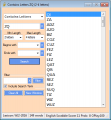| « VITA (Taxwise) Intro | Unexpected Taxes » |
VITA Pointers I
After the first week at VITA I came across some issues that might be of interest to other VITA-ites.
1099-MISC
There is an option to add Businees/1099-MISC income in the Income page of the Interview, where you add the W-2s and other 1099s. Only use that option if the 1099-MISC is for business income. One of the guides as to whether it is actually for business income is to look at what box the amount is entered in. The back of the 1099-MISC can help you with that. Even if the income is in box 7, normally for self-employment income, if the income is temporary or sporadic it should be entered as Other Income (line 21).
If you do enter an amount for Business/1099-MISC, TWO it will generate a Schedule C automatically and they may have to pay self-employment tax. The other way to enter 1099-MISC is to use the 1099-MISC worksheet. Following the interview section, to get the worksheet on the return, add form, search for 1099, and then add the 1099 worksheet. When you finish, link it to line 21. If you only have one 1099-MISC, and it is for items in box 3 or box 8 of the 1099-MISC you can just add that income directly to line 21 of the 1040 (Other income) if you want.
Schedule E income reported on a 1099-MISC is peculiar in Taxwise Online, which I will cover later.
Source: Schedule C instructions, Back of 1099-MISC
Rental Income
It's tempting to enter all rental income on a Schedule E, if the taxpayer is being paid rent. However, if you are renting your house to a relative who is not paying fair rental value, then you may not have to file a schedule E for the rental. Determining this involves counting the number of personal days use.
Source: Publication 527, Schedule E instructions
Charitable Contributions
Most contributions over $250 should have a statement saying that the taxpayer didn't receive anything tangible for the contribution. I've received annual statements from churches that explicitly say that. However, that is not required in the case of Religious Organizations providing only intangible religious benefits. If the taxpayer has receipts that indicate they have made contributions to their church and they indicate that they didn't receive anything for it, it's allowable as a charitable contribution.
Of course, we do not have to verify that a taxpayer has made charitable contributions unless we have a good reason to doubt it. It is their responsibility to present proof to the IRS if they ask for it.
Source: Publication 1771; Publication 17
Schedule C income
If expenses are minor, you may be able to file Schedule C-EZ instead of Schedule C. It's true that Schedule C-EZ is much simpler, but if you use Schedule C to list the itemized expenses, the taxpayer will have that for future reference. It'll add them up for you and the list could serve as a reminder to ask about other expenses they may be able to deduct.
Property Taxes
If a taxpayer has paid property taxes but doesn't have the receipt or amount, you can go to the Smith County Appraisal District website and lookup their property and view tax history. Also, taxes are deductible in the year paid. If paid in January of this year, it won't be deductible until next year. It should be worth noting that the appraisal district is not documentation, simply an aid in determining what was paid if the taxpayer did not bring the receipt. Remember that taxes paid are only deductible in the year paid.

